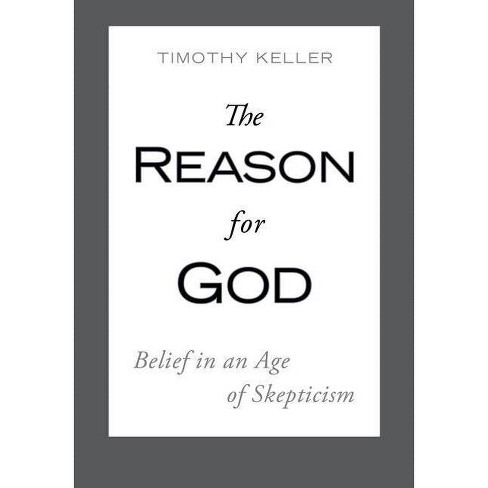When I was losing my faith fourteen years ago, Tim Keller’s writings and sermons gave me a new understanding of the gospel and a restored confidence in the truth of the Christian message.

I know that I’m not alone in this. I have met a number of people who have said that Keller helped them return to faith, discover Christian faith for the first time, or gain an increased confidence in the faith they already possess.
Although Keller was a highly effective pastor of a congregation that had 5,000 members by the time of his death last week, his widest influence came through his writings and recorded sermons that reached millions of people who could never attend New York’s Redeemer Presbyterian Church in person. And while his pastoral insights and devotional writings on prayer, scriptural meditations, and the gospel sold widely, he arguably made his greatest impact as a Christian apologist—that is, as someone who provided persuasive arguments for the truth and reasonableness of the Christian faith.
The New York Times bestseller that first put him on the map—and that continued to sell more copies than any of his other books—was The Reason for God: Belief in an Age of Skepticism (2008). That book, which compiled the arguments that he made to thousands of skeptical New Yorkers over the course of twenty years, revolutionized Christian apologetics and laid a foundation for several other Keller books that were aimed at skeptics who needed a good reason to believe. Keller gave them reasons to believe – and perhaps not always the reasons they were expecting.
What was Keller’s approach to apologetics—and why was it so pathbreaking?
I think that Keller’s effectiveness as an apologist stemmed largely from his ability to combine four very different approaches to apologetics—the classic evidentialist approach, the narrative apologetics of C. S. Lewis, the presuppositionalism of Cornelius Van Til, and the psychological insights of Jonathan Edwards— and translate those approaches into an idiom that answered the questions of a 21st-century college-educated urban professional. Most Christian apologists have mastered only one of these approaches, but Keller was unique in synthesizing all of them in a way that seemed fresh and compelling.
Some chapters in Reason for God are written from an evidentialist perspective, which is perhaps the oldest and best known of the approaches to Christian apologetics in the United States today. For centuries, Christian apologists have appealed to evidence from history and science to argue that the universe must have had a designer and that the scriptural testimony of Jesus’s miracles and resurrection is credible. Keller made similar arguments. Drawing on the historical research of N. T. Wright, he argued that the resurrection narratives could not have been legends or the product of hallucinations, but were instead credible testimonies of genuine encounters with a resurrected Jesus.
For Keller, the evidence for this historical claim was supremely important. “If Jesus rose from the dead, then you have to accept all he said,” Keller wrote. “If he didn’t rise from the dead, then why worry about any of what he said? The issue on which everything hangs is not whether or not you like his teaching but whether or not he rose from the dead” (Reason for God, 210).
But Keller also recognized that people often need more than factual evidence to experience a paradigm shift, because our presuppositions influence the way in which we interpret facts. Like many Reformed evangelicals of his generation, he was influenced by Cornelius Van Til’s presuppositionalism and by the concept of “worldview.”
Earlier presuppositionalists had attempted to argue against secular worldviews by demonstrating their inconsistency. Keller did a bit of that as well on occasion. He urged skeptics to “doubt their doubts” by examining the presuppositions that had led them to dismiss Christianity. But he was more likely to appeal to skeptics’ imagination and longings and leave them feeling that even if they couldn’t quite bring themselves to believe in Christ yet, they sort of wanted to do so.
To bring skeptics to this point, he borrowed from C. S. Lewis’s narrative apologetics to paint a picture of a more meaningful, better world.
“I always say to my skeptical, secular friends that, even if they can’t believe in the resurrection, they should want it to be true,” Keller wrote (Reason for God, 220).
Keller concluded The Reason for God not with a grand summary of the evidence for the resurrection, but with chapters on “The Dance of God” and a lengthy summary of Flannery O’Connor’s fictional vision of a final judgment. In both his sermons and his writings, Keller frequently borrowed from novels, movies, and short stories, because he believed that fiction could speak to people’s hearts in a way that factual evidence alone could not.
While this is now a common technique among Christian apologists, it wasn’t very common among evangelicals before Keller popularized it. Before Keller wrote The Reason for God, the most widely sold works of Christian apologetics were strictly evidentialist in approach—books such as Josh McDowell’s Evidence That Demands a Verdict and Lee Strobel’s The Case for Christ. C. S. Lewis had successfully used fiction to evoke longings for a better world, but it took Keller (who re-read both Lewis and J. R. R. Tolkien numerous times) to bring this fiction-based approach into the realm of Christian apologetics.
But Keller brought one additional strand into his works of Christian apologetics that ultimately made the difference for me. When I first read The Reason for God, immediately after it was published in 2008, I was already very well versed in Christian evidences, because I had read and re-read stacks of books that attempted to marshal the evidence of science and history to argue for the truth of the Bible’s message about Jesus. But unfortunately, after years of reading books on Christian evidences, I had become increasingly convinced that many of their claims were unsupportable.
I picked up The Reason for God hoping that it would give me some facts that I hadn’t considered. For the most part, it didn’t. The evidence for the resurrection of Jesus, I thought, was pretty strong—but the evidence for the historical veracity of some other parts of the Bible was so weak that I was just about ready to jettison the whole thing. Keller’s evidentialist chapters didn’t say much that I hadn’t read elsewhere before. I had reached a point of despair in my Christian life, because I had started to think that Christian truth claims could not be harmonized with historical and scientific evidence.
And if I found Keller’s evidentialism unconvincing, I was even less impressed by his attempt to channel C. S. Lewis and evoke a longing for a better world. I had already read most of Lewis’s works (both his fiction and his nonfiction), but given my strongly rationalist personality, I found it easy to dismiss fiction as wishful thinking. I was completely unmoved by Keller’s chapter on “The Dance of God” when I first read it.
I was looking for solid empirically based evidence, and after reading stacks of Christian apologetics books that I found increasingly unconvincing, I thought that Keller was my last hope of finding it. I even visited his church in New York and heard him speak in person in the hope that maybe I would gain some insights that I hadn’t acquired from his book or his recorded sermons. I found Keller to be a wonderful speaker – but I didn’t hear anything in his sermon on the first marriage (he was preaching on Genesis 2 that day) that brought me to faith or changed my life.
But then I read another book that Keller also published in 2008: The Prodigal God: Recovering the Heart of the Christian Faith. If Reason for God was mainly a channeling of Christian evidentialism and the apologetics of C. S. Lewis and Cornelius Van Til, The Prodigal God drew more on the insights of Jonathan Edwards (even if it does not quote Edwards directly very much) to convince skeptics of why they need the gospel.

Keller’s The Prodigal God showed me who I really was in a way that I had never seen before. At the time I read this book, I had spent my entire life as someone whom Keller described as the “elder brother” of Jesus’s parable of the prodigal son in Luke 15.
When retelling the story of the prodigal son, preachers often emphasize the sin and salvation of the younger brother who squandered the family inheritance but then returned home to his father’s welcome. Yet, according to Keller, Jesus’ parable is equally about the sins of the “elder brother” who refused to go into his father’s feast.
Elder brothers, Keller argued, are self-righteous, religiously observant people who find refuge in their own goodness but who don’t really love the Father. They often “have an undercurrent of anger toward life circumstances, hold grudges long and bitterly, look down at people of other races, religions and lifestyles, experience life as a joyless, crushing drudgery, have little intimacy and joy in their prayer lives, and have a deep insecurity that makes them overly sensitive to criticism and rejection yet fierce and merciless in condemning others” (The Prodigal God, 70-71).
What elder brothers need is the freedom that comes from loving the Father and feeling his acceptance. Their good works are really a way for them to distance themselves from God, because they think that if they’re good, they won’t really need God’s salvation. They, therefore, need to repent of the motivations even for their good works, because in doing good, they weren’t really loving God—in fact, they were doing the opposite.
I recognized myself in that picture. I had attended church every week (and usually multiple times per week) for my entire life, up to the time that I read Keller’s book. I had probably heard more than 2,000 sermons. I had attended thousands of Bible class sessions—and taught a few myself. But I felt very distant from God, because I didn’t really believe the gospel—and, in fact, had not really understood it up until that point. I was asking a lot of skeptical questions partly because I didn’t really sense the need for a Savior. I had thought of sin merely as violations of God’s commands—and by that standard, I thought (incorrectly, of course) that my need of a Savior was only moderate. When I read The Prodigal God (and then later, Keller’s short book The Freedom of Self-Forgetfulness), I realized that the Christian message described my own psychology and my own motivations in a way that nothing else did. It described my real need—which was much greater than I had ever before realized. My whole life had been deeply sinful, because the good works and squeaky-clean moral living had been motivated by something very different from real love for God and desire for his glory and his grace.
Once I realized my need for a Savior in a new way—and once I came to believe the gospel in a way that I never had before—I began to see the harmony of scripture in a way that I hadn’t before, because I saw that some of the “problem passages” that had troubled me were really telling me something important about God. I eventually saw that the historical and scientific questions that had troubled me could be seen in a different light. Keller’s evidentialist arguments and the narrative apologetics that he borrowed from C. S. Lewis began to seem a bit more convincing. The evidence of the resurrection and of Jesus’s claims to divinity was especially compelling, I thought. But I wouldn’t have necessarily gotten to that point in my thinking if I hadn’t also encountered Keller’s teaching on sin, which comes straight out of Reformed theology and the preaching of Jonathan Edwards, but which he has packaged in the idiom of the twenty-first century.
I think that Keller’s ability to channel all of these strands of Christian apologetics to meet the needs of his audience was one of the keys to his far-reaching influence. Some of his hearers were persuaded by the historical evidences that he presented. Others might have been moved by his evocations of C. S. Lewis’s fictional narratives—or challenged to re-examine their presuppositions when Keller channeled the insights of Cornelius Van Til. Still others, like me, might have been most affected by his teachings on sin and the psychological insights he provided from Reformed understandings of what it means to rebel against God.
But I also think that there was one other key to Keller’s success: the fact that he himself was deeply affected by the gospel. Keller was a remarkably humble man. Unlike many megachurch pastors, he didn’t seek power for himself. He didn’t like to talk about himself or brag about his success—but he wasn’t falsely self-effacing either. He didn’t erupt in anger, berate members of his ministry team, or hold his kids to impossibly high standards—all of which have been all-too-common sins for people in similar positions. He went above and beyond in giving credit to others for his ideas, which he claimed were ultimately not his own. He was genuinely open about some of his own struggles with prayer and the temptation to be liked by others. He viewed himself not as a spiritual guru, but as a man saved by grace, who was on a pilgrimage with others.
In other words, he lived his life as someone who was deeply conscious of the gospel and of the fact that he needed the grace of God. When people saw how the gospel transformed Keller, some of them (including me) wanted to see how it could change them as well.














